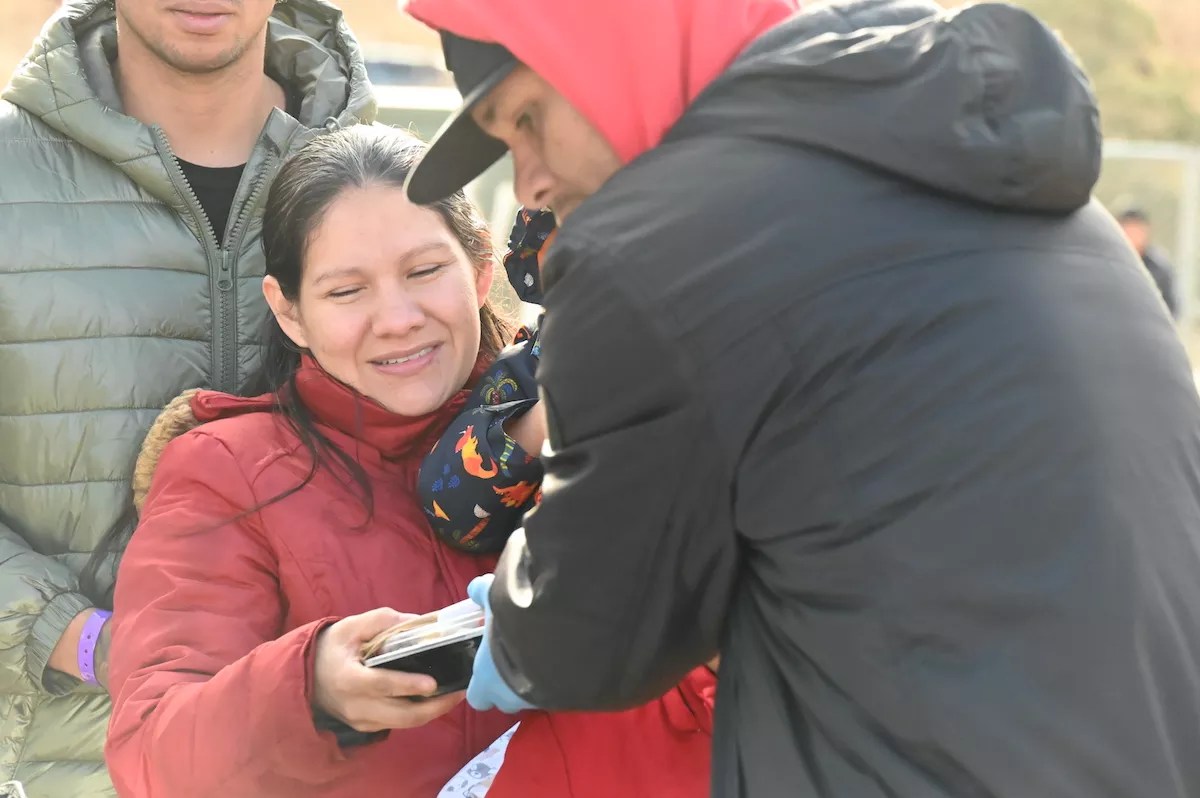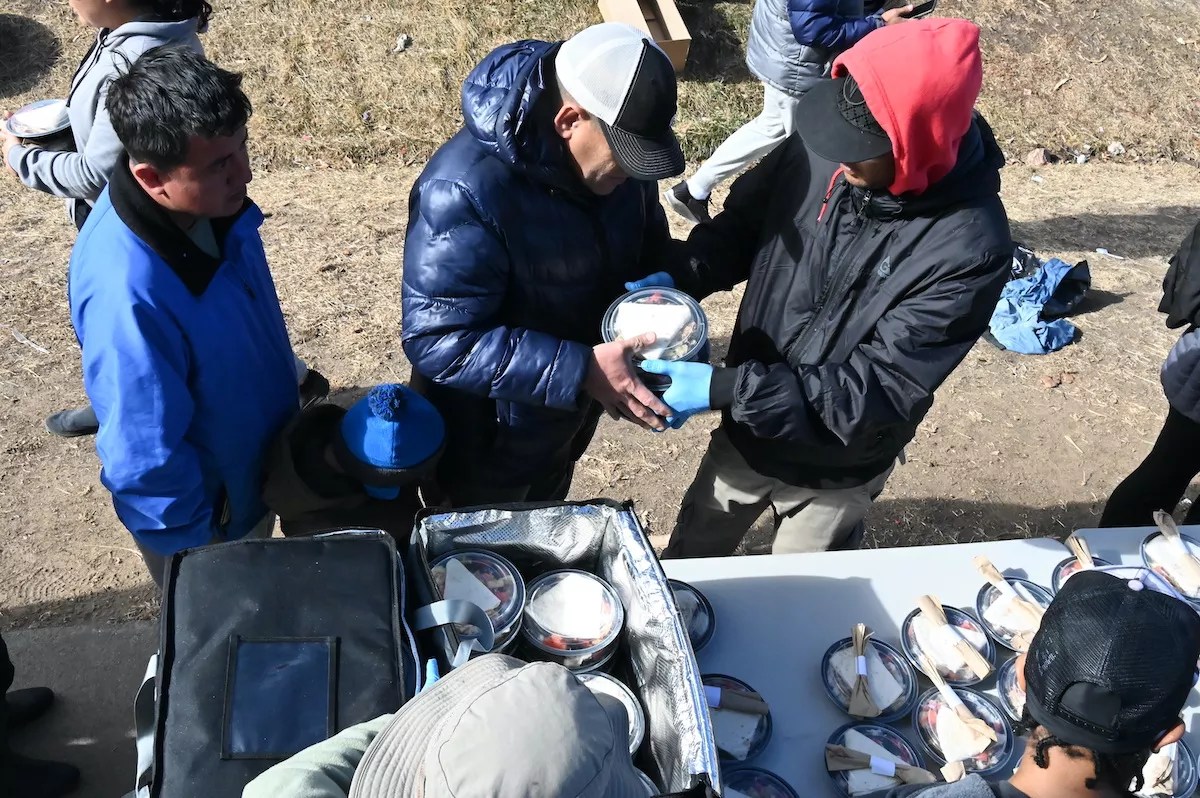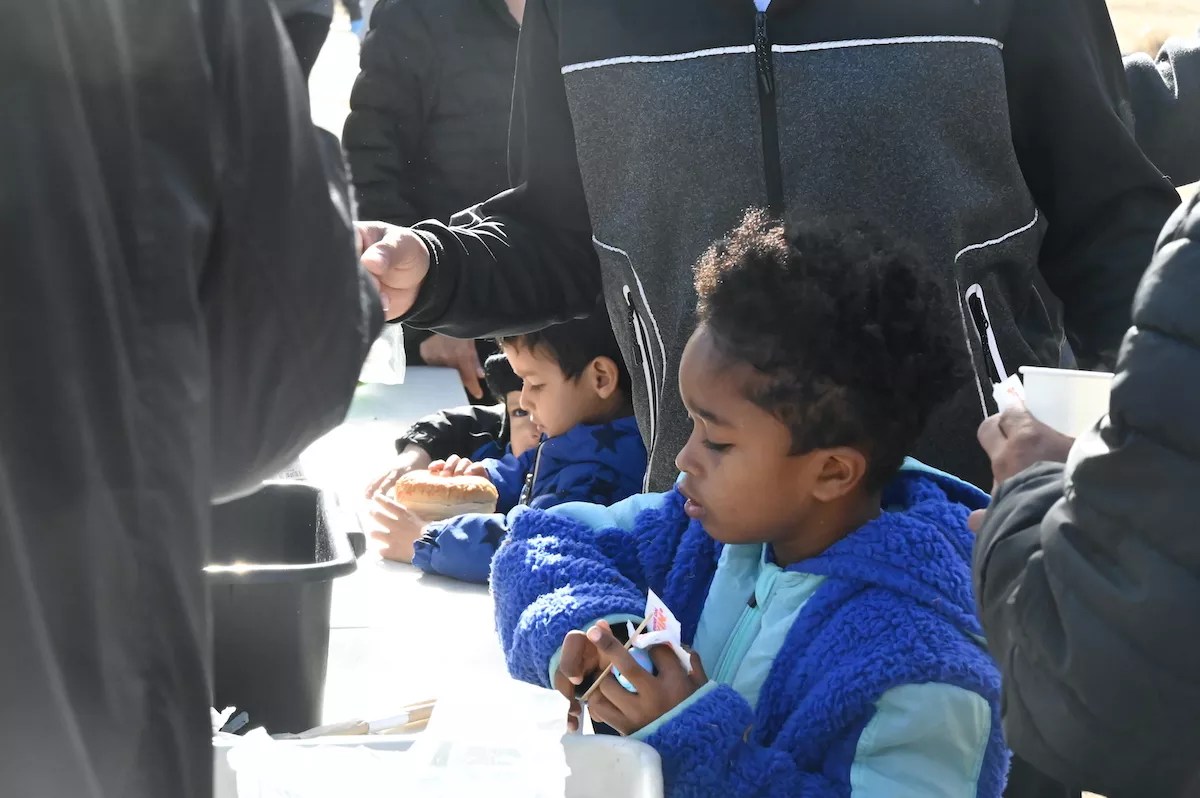
Bennito L. Kelty

Audio By Carbonatix
Frayana Camaray came to Colorado from Venezuela last year and hungers for a job. But because she doesn’t have permission to work, she’ll settle for a free lunch…for now.
“Since we don’t have work, we come out here to wait for the people who have their organizations to give us a plate of food,” Camaray says. “If we had work, we could pay for rent, buy our own food, and we wouldn’t have to be here waiting.”
Camaray is standing with more than a hundred other migrants outside a shelter at the Comfort Inn in Montbello, waiting for volunteers from SAME Cafe to stack packaged meals – tortillas, pork, rice, beans and a salad – on a folding table. Every Monday, Wednesday and Friday this month, SAME volunteers have been coming here to distribute 200 lunches.
SAME Cafe is located at 2023 East Colfax Avenue. Its name is short for “So All May Eat,” and it’s been a resource for Denver’s neediest since the nonprofit was founded in 2006. At this point, it’s the longest-running participation-based restaurant in the country; people stop by the cafe and pay what they can for meals.
SAME Cafe has never seen a shortage of need, but in December, executive director Carrie Shores realized that trying to feed recent migrant arrivals had become “a full-blown crisis” for Denver, she says. She heard that migrants in shelters “don’t have enough food to eat, breakfast is never enough, dinner has sometimes been a piece of bread,” she recalls.
“Several people had reached out to us and said, ‘Is SAME able to support this in any way?'” Shores adds. “Of course, as a nonprofit organization, the answer is, ‘Yes, we want to support you, but let’s figure out the most sustainable way to do it, because currently we don’t have money in our budget to support this.'”
Soon SAME figured out that the best way to help might be delivering meals to shelters, as it did during the pandemic. “COVID prepared us to be able to do something like this,” Shores says. “During the shutdowns, we never shut down. We were basically packaging 400 meals a day for anybody to come have access to, as well as delivering them to motels where folks were living due to losing housing, jobs, resources.”
But SAME didn’t have the resources it needed to resurrect such an effort. The nonprofit has a full-time staff of six and relies on help from about 850 volunteers; it survives on about $800,000 in contributions a year. The existing budget wasn’t enough to cover feeding migrants, too. But after launching a Facebook campaign to help serve the shelters housing migrants, donations “flooded in,” Shores says.
The campaign brought in $3,800, while an anonymous donor called to offer $5,000. People also donated enough food in one week for SAME Cafe to make the first thousand meals. “Within one week’s time, we were able to get enough food to support the next three weeks of us serving meals,” Shore says. “People were like, ‘We’re going to have a food drive, so we’re going to bring you rice, beans and pork.'”

Migrants pick up lunch outside their shelter in Montbello.
Bennito L. Kelty
SAME Cafe started delivering lunch to the Montbello shelter designated for migrant housing on January 4; since then, it has served about 2,000 meals there. It has used more than a thousand pounds of food to make those meals, and “all of the food we have been serving has been donations of rice, beans, fruit, vegetables and turkey or pork,” Shores notes.
Since December 2022, nearly 38,000 migrants have come to Denver, most on buses chartered out of Texas. The City of Denver offers them a bus ticket elsewhere or a place in a shelter; it’s spent more than $40 million on migrant aid in the past year. But the numbers started swelling again late this fall, and then came freezing cold temperatures at the start of the year.
On January 11, the city housed nearly 5,000 migrants in ten shelters, including two emergency facilities. One was the congregate shelter at the McNichols Building, at 144 West Colfax. “The breakfast is very basic, they don’t give you lunch, and dinner is like a snack,” Camaray says. “That’s why in reality, the majority or everyone goes out to eat, but we don’t have work.”
“While we are limited in resources, we do ensure that all adult guests receive at least two meals a day as well as snacks, and that all children receive three meals daily,” responds Jon Ewing, a spokesperson for the Department of Human Services.
Some migrants complain not just about the number and size of the meals served, but the prohibition against bringing in perishable food. That’s because of pest problems, the city says. Denver is just trying to keep migrants “safe and comfortable,” Ewing explains, but he adds that he understands the rules might not make sense on the surface.
“We’ve had things about food pretty much since the beginning of the sheltering effort. The rules are in place on our end for a reason. It may not be immediately apparent. I get it, I totally get it,” Ewing says. “But there’s rhyme and reason for it. It’s not just us being sticklers for the rules.”

Kids are given three meals a day at Denver’s migrant shelters, but adults are only given two.
Bennito L. Kelty
Rosales Ninosco, a Venezuelan migrant staying at the Montbello shelter with her two-year-old daughter, doesn’t mind the rules; she says that the meals are “healthy” and she’s happy with what they get.
“It’s low in sugar, it’s low in salt, but they offer you the sugar and the salt in case that’s what you like,” Ninosco says. “We came here to work, and this is the support they give us. That’s why my opinion is different, because I’m, as you can imagine, very grateful.”
Aside from community groups that have organized on Facebook, SAME Cafe is the only organization providing meals to migrant shelters, Ewing says. “Because we are operating with limited resources, we have openly welcomed the community to assist us in providing additional meals,” he adds. “We are so incredibly grateful to groups like SAME Cafe, which help us to provide additional food to care for our migrant guests.”
“These people need food. They need access to healthy food, and they need it to happen in a more dignified way,” Shores says. “That’s where we come in.”
Still, SAME Cafe needs donations to keep the lunch deliveries going, as well as volunteers who can offer their time; if support increases, the nonprofit might start serving a second shelter and get another van. And if support does not increase?
“There is no current end date for us to stop delivering,” Shores notes. “But that can change due to availability and other factors, such as donations continuing to come.
“The biggest potential issue is keeping this momentum going,” she adds. “Sometimes things lose buzz, and it’s on to the next thing. This is long-term for us. We don’t just want to be responding now. We want to be able to support these folks.”